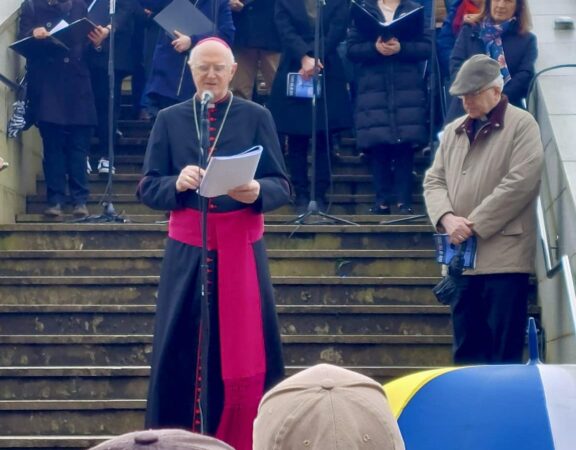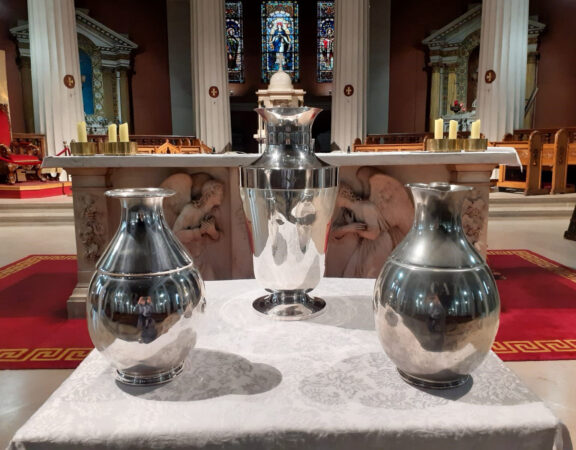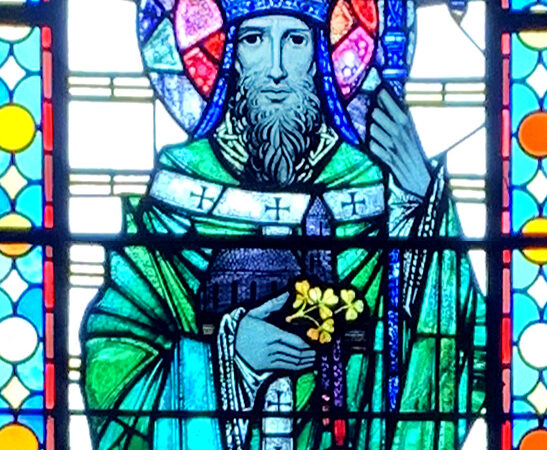Third Sunday of the Year 2010
ORDINATION TO THE DEACONATE OF STEPHEN DEIGHAN
ORDINATION TO THE DEACONATE OF STEPHEN DEIGHAN
Words of introduction and homily notes of
Most Rev. Diarmuid Martin
Archbishop of Dublin, Primate of Ireland
—————-
Church of the Holy Cross, Dundrum, 24th January 2010
Most Rev. Diarmuid Martin
Archbishop of Dublin, Primate of Ireland
—————-
Church of the Holy Cross, Dundrum, 24th January 2010
Introduction
I am delighted to be here in this Church of the Holy Cross in Dundrum to celebrate the Sunday Eucharist with you during which Stephen Deighan will be ordained Deacon at the service of the Archdiocese of Dublin.
Stephen carried out his studies in Saint Patrick’s College Maynooth and for some months now he has been working in this parish which today, joins with those who were responsible for his formation in presenting him to the Church as a worthy candidate for the deaconate.
Together with Stephen’s parents, family and friends, we all gather around Stephen in prayer on this occasion and we commit ourselves to supporting him with our care, our affection and our prayer throughout his future ministry as deacon and later as a priest.
Homily
Once again I wish to thank the community of this Parish and pastoral area team for the manner in which you have supported Stephen in these months as he begins his pastoral ministry.
You will have noted the words of the presentation of the candidate which say: “after enquiry among the people of Christ”. A vocation and a calling in the Church is not simply a personal recognition much less a personal possession to be used for personal fulfilment. Ministry is something which springs from the Church, out of the faith of the people of Christ. Ministry is always a gift given to and for the Church. Ministry in the Church is always service within the Church.
Stephen in all your future ministry never look on yourself as self-directed or self sufficient. Never consider yourself outside or much less above Christ’s people. Your vocation springs from out of Christ people, beginning with your parents and your family, and the communities in which you grew up and were educated. The faith they passed on to you enabled you to hear and recognise Christ’s call to you. Your ministry belongs to the Church.
And I say to all here present that Stephen’s ministry belongs also to you. He needs the continuing prayers and support of God’s faithful people, including the sense of belonging within of the clergy of the diocese. Ministry is never a solo run. Fellowship is of the essence of all ministries in the Church. Together we are Christ’s body.
What is the Church? In our times we have encountered great change in the Church. Some of that change has been positive and universally welcomed. But there are dramatic elements of crisis, of scandal and anger, of turning away and rejection, of disinterest and for many of a sense of irrelevance.
We talk in various ways about the Church. We talk of an “institutional Church” and we affirm that “we are the Church”; we talk of a teaching Church and of a listening Church; we talk of a missionary Church and of a Church which is missing the point, a Church which is seen to be out of tune with modern life and values.
What Church is Stephen being called to serve in? There is a sense in which the deaconate is in itself an image and an icon of what the Church is and should be. The rite of ordination mentions on more than one occasion the tasks assigned to the deacon: proclaiming the word of God, service at the altar and service to the community.
At the moment, later in the liturgy, of the presentation of the Book of The Gospel to Stephen we will hear the striking words:
Receive the Gospel of Christ who herald you now are. Believe what you read,
Teach what you believe,
and practice what you teach.
The Church lives in a very special way from the Word of God and especially from the Gospels.
The Gospel reading from Saint Luke which we have just heard is taken from two separate chapters.
In the first part, in a sort of foreword to his Gospel, Saint Luke explains why he is writing. He is not writing a novel or a biography to impress or to top the best sellers list. He is gathering in an ordered account what others writer had attempted to do, to chronicle “the events of what has taken place among us, as these were handed down to us by those who were from the outset eyewitnesses and ministers of the word”.
The Gospel is in the first place not something that someone writes; the Gospel is received. It is not our Gospel; we receive the Gospel and the Gospel changes us.
The Gospel is about fact; it is a written account of what Jesus said and did. But it is more. It is a narrative of how Jesus with his words, deeds and life shows us who God is. Saint Luke gathers together not just the witness which he has received from others as a journalist would write a news report. Luke transmits an account of the God revealed in Jesus Christ, challenging the false God’s that we create for ourselves and the false ideas of God which are disseminated by the lives of those who do not believe what they teach and do not practice what they teach.
The basis of our faith is the God communicated to us in Jesus Christ, not just in the past, but today in that Word which is for us still communication and encounter with God. That Stephen is what, reading, you are called to believe, to teach and to practice.
Over the coming weeks, the Archdiocese of Dublin will be distributing widely a special edition of Saint Luke’s Gospel. It is not being distributed as a firm would distribute a calendar at the beginning of the year, a sort of useful advertisement to remind you that the Church is still there. The Gospel is being distributing so that you can be brought into the mystery of the revelation of God in Jesus Christ.
When we talk about reform and renewal in the Church we are tempted to think in terms of reform of structures and personnel. That indeed is needed. But on its own that would simply be a sort of business strategy rather than real conversion. For too long, our Catholic communities have looked on the Scriptures as secondary to the life of being a Christian. We will never have a true knowledge of Jesus Christ without a personal knowledge of the Scriptures, of how throughout history God appears as one who reveals himself and whose mission is accomplished in history.
The second section of the Gospel reading tells us something more about the mission of Jesus, as to how he is to be the one who reveals and realises in history who God is and what God is like.
This second section is in a certain sense a second Foreword. It is the foreword which helps us at the very beginning of the Gospel to understand the words and deeds that follow. It sets out the mission of Jesus, of what he will do and say about the good news and about how the Good News in realised.
Jesus makes this announcement of who he is and what his mission is to be in his own home town. He chooses his home town not as a comfortable setting among those who knew him well. Indeed it was to be the very opposite, his own would not accept him. Jesus chooses to reveal himself not among the like-minded, or in a media press conference, or in a place of prestige. He chooses to reveal his identity at the beginning of his mission in the Synagogue of a remote and unimportant town of little worldly significance. The good news of the revelation of the God who saves is given to the poor in a poor village. Jesus’ message of liberation and of mercy is rejected by the intellectual arrogance of his own people.
In writing my introduction, together with the Church of Ireland Archbishop, John Neil, to the special edition of Saint Luke’s Gospel I used a phrase of the Italian poet Dante Alighieri who called Saint Luke scriba mansuetudinis Christi, the chronicler of the mildness or the kindness of Christ.
Stephen that is the Gospel that is being handed over to you; that is the Gospel that we as Christian community are called to open, to ponder and to realise in our life. It is far from the arrogance and power seeking which can easily invade our lives as individuals, as Christians and indeed as a Church.
Christ himself is the foundation of what we are as Christians. Reform and renewal of the Church can only come from our knowing the Jesus of the Gospels. Jesus alone is the unshakeable foundation of the Church. The Church is reformed and renewed in the proportion in which we as individuals, as community and as institution allow that Gospel message of divine love which became incarnate in Jesus Christ to direct our lives and decisions.
The Christian message is not a message which seeks power or political influence, but which preaches and practices goodness and love. The Church does many things in society, but its primary purpose is to teach the message of Jesus Christ. It is a message of a love that is gratuitous, of a love that cares for each one individually, especially those who are sick, or weak, or vulnerable, that reaches out to the sinner, to those who are drifting in their lives, to those who cannot find their way, even to those who are angry and reject that message.
Stephen you are today charged to follow the path of service witnessed by Jesus. But we are too, all of us. Our Church must become a fellowship of service and fidelity to the Word of God. To attain us, our service in the world must be linked also to our service at the altar, to our prayer in union with Christ. That is why the Church in the Archdiocese of Dublin will shortly implore the help of the triune God and of all the Saints in heaven for you Stephen, and then invoke the Holy Spirit on you through the laying on of hands in accordance with the long tradition of the Church.









